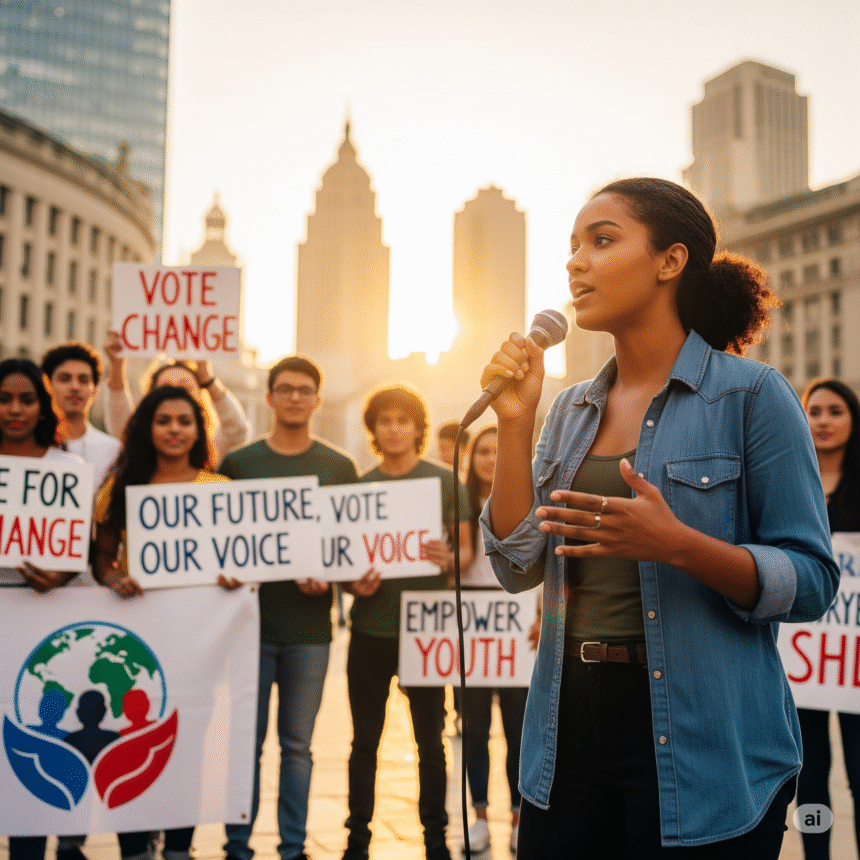In a rapidly evolving world, the role of youth in politics has become increasingly vital. Representing energy, innovation, and a deep connection to contemporary issues, young individuals have the potential to drive transformative societal change. As one of the youngest nations globally, India stands at a crossroads where youth participation in politics could redefine its social, economic, and political landscape.
The Role of Youth in Transforming Society
1. Advocating for Contemporary Issues:
Young leaders bring fresh perspectives to issues such as climate change, digital privacy, mental health, and social justice. By prioritizing these topics, they address the pressing needs of society, often overlooked by traditional leadership. For instance, the rise of youth-led climate movements like Fridays for Future India has placed environmental concerns on the political agenda.
2. Bridging Generational Gaps:
Youth participation in politics creates a balance between the experience of older generations and the innovation of younger ones. This synergy ensures that policies are both forward-looking and grounded in institutional knowledge, fostering inclusive decision-making.
3. Mobilizing Change Through Technology:
With their fluency in digital platforms, young leaders can leverage technology to connect with diverse communities, spread awareness, and organize movements. Social media campaigns on issues like gender equality and education reforms demonstrate how technology-driven youth activism can amplify societal impact.
Examples of Youth-Driven Societal Change
1. India’s Anti-CAA Protests:
Led by students and young activists, these protests exemplify how youth can organize, voice concerns, and compel policymakers to reconsider legislation. The movement brought together diverse communities to defend democratic values.
2. Global Climate Action:
Indian youth have played a key role in global climate strikes, pressuring governments to adopt more sustainable policies. From local clean-up drives to advocacy for renewable energy, their efforts highlight how grassroots activism can lead to policy change.
3. Social Justice Advocacy:
Youth-led campaigns for LGBTQ+ rights and the decriminalization of Section 377 in India reflect the transformative power of young voices in challenging societal norms and driving inclusivity.
Challenges to Youth Empowerment in Politics
1. Lack of Representation:
Despite their numbers, young people are underrepresented in decision-making roles. In India, less than 10% of parliamentarians are under the age of 40, creating a gap between policymakers and the aspirations of the youth.
2. Perceived Lack of Experience:
Young leaders often face skepticism regarding their ability to handle complex governance issues. This perception hinders their participation and limits opportunities for meaningful contributions.
3. Institutional Barriers:
Entrenched political hierarchies and lack of mentorship programs prevent many young individuals from entering politics or scaling their impact.
How Youth Can Drive Transformation
1. Grassroots Engagement:
Youth should actively participate in local governance and community-building initiatives. This involvement not only addresses immediate issues but also builds leadership skills for larger roles.
2. Leveraging Education:
Educational institutions must integrate political literacy and civic education into curricula. By equipping students with knowledge of governance and public policy, they can foster informed and responsible leaders.
3. Collaborative Leadership:
Young leaders must collaborate across age groups, political ideologies, and sectors to create holistic solutions. Building alliances with experienced politicians can help bridge the gap between innovation and practicality.
Conclusion
Empowering youth through politics is essential for fostering a society that is progressive, inclusive, and responsive to modern challenges. By stepping into leadership roles, advocating for critical issues, and leveraging technology, young people can redefine governance and catalyze social transformation. With structural reforms and societal support, the youth of India have the potential to lead the nation into a brighter, more equitable future. The time to harness this potential is now.


Leave a Reply